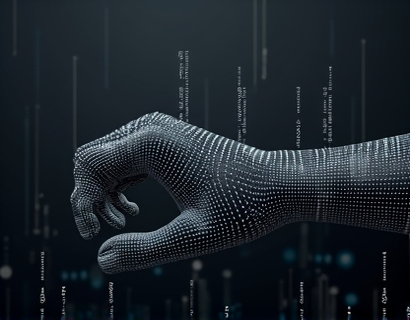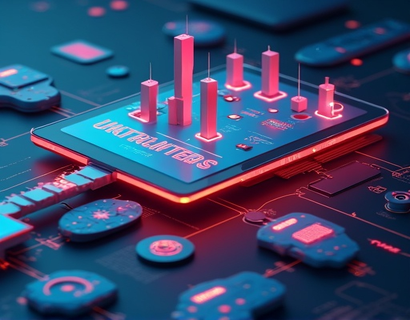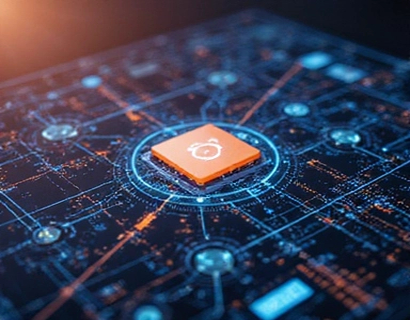Unlocking Advanced Digital Transformation: The Synergy of Crypto and AI
The intersection of cryptocurrency and artificial intelligence represents a frontier of digital innovation, where the two technologies converge to redefine app ecosystems and user experiences. This exploration delves into the transformative impact of merging these advanced technologies, offering insights for tech professionals and early adopters eager to harness their potential. By examining the synergy between crypto and AI, we uncover how these forces are not only reshaping digital landscapes but also driving unprecedented levels of efficiency, security, and personalization in app ecosystems.
Understanding the Basics: Cryptocurrency and Artificial Intelligence
To appreciate the convergence of cryptocurrency and AI, it's essential to first understand each technology individually. Cryptocurrency, a digital or virtual currency secured by cryptography, operates on decentralized networks like blockchain. This decentralization ensures transparency, security, and reduces the need for intermediaries, making transactions faster and more cost-effective. On the other hand, artificial intelligence encompasses a range of technologies designed to simulate human intelligence in machines, enabling them to learn from data, recognize patterns, and make decisions with minimal human intervention.
When combined, these technologies create a powerful synergy. AI's ability to process vast amounts of data and identify complex patterns can be leveraged to enhance the security, efficiency, and user experience of cryptocurrency systems. Conversely, the decentralized and secure nature of cryptocurrency provides a robust framework for AI applications, ensuring data integrity and fostering trust among users.
The Role of Blockchain in AI Data Management
One of the most significant contributions of blockchain to AI is in data management. Traditional AI systems rely on centralized databases, which are vulnerable to breaches and manipulation. Blockchain offers a decentralized alternative, where data is stored across a network of nodes, making it inherently more secure and tamper-proof. This ensures that AI models are trained on reliable and unaltered data, enhancing the accuracy and trustworthiness of AI-driven decisions.
Moreover, blockchain's smart contracts can automate data sharing and access control, streamlining the process of data exchange between different AI systems. This automation reduces manual intervention, lowers costs, and accelerates the development and deployment of AI applications. For instance, in a healthcare app ecosystem, patient data can be securely shared among various AI-powered diagnostic tools, improving the quality of care while maintaining patient privacy.
Enhancing Security with AI-Powered Cryptography
Security is a paramount concern in both cryptocurrency and AI. AI can significantly bolster the security of cryptocurrency systems by detecting and mitigating threats in real-time. Machine learning algorithms can analyze transaction patterns to identify anomalies and potential fraud, providing a proactive defense mechanism. This is particularly crucial in a decentralized environment where traditional security measures may be less effective.
Conversely, cryptographic techniques can enhance AI systems by ensuring the integrity and confidentiality of data used in training and inference processes. Homomorphic encryption, for example, allows AI models to process encrypted data without decrypting it, preserving data privacy while maintaining computational efficiency. This dual approach ensures that both cryptocurrency and AI systems benefit from enhanced security measures.
Personalization and User Experience in App Ecosystems
The integration of AI in cryptocurrency apps can lead to unprecedented levels of personalization, significantly improving user experience. AI algorithms can analyze user behavior, preferences, and transaction history to provide tailored recommendations and services. For instance, a crypto wallet app can use AI to suggest optimal investment strategies based on the user's risk tolerance and market trends, making the investment process more intuitive and effective.
Furthermore, AI-powered chatbots and virtual assistants can offer 24/7 customer support, addressing user queries and providing guidance in real-time. This not only enhances user satisfaction but also reduces the workload on human support teams, lowering operational costs. In a broader app ecosystem, personalized experiences can foster greater user engagement and loyalty, driving the adoption of both cryptocurrency and AI-driven solutions.
Decentralized Finance (DeFi) and AI Optimization
Decentralized Finance (DeFi) represents a revolutionary approach to financial services, leveraging blockchain technology to create open, transparent, and accessible financial systems. AI can further optimize DeFi platforms by enhancing risk management, fraud detection, and algorithmic trading. Machine learning models can analyze historical data to predict market trends and optimize asset allocation, reducing the risk of losses and maximizing returns.
Smart contracts, powered by AI, can automate complex financial operations such as lending, borrowing, and insurance claims, executing transactions with precision and speed. This automation not only increases efficiency but also reduces the potential for human error and fraud. In an app ecosystem focused on financial services, the combination of DeFi and AI can create robust, user-friendly platforms that cater to a wide range of financial needs.
Supply Chain Transparency and Traceability
Beyond finance, the synergy of cryptocurrency and AI can transform supply chain management by enhancing transparency and traceability. Blockchain's immutable ledger ensures that every step in the supply chain is recorded and verifiable, while AI can analyze this data to identify bottlenecks, optimize logistics, and ensure compliance with regulations. For example, in the food industry, AI-powered blockchain solutions can track the origin and journey of products, ensuring food safety and reducing the risk of contamination.
In the context of app ecosystems, businesses can leverage these technologies to provide consumers with detailed information about product provenance, sustainability, and quality. This level of transparency builds trust and loyalty, driving consumer preference towards brands that prioritize ethical and transparent practices.
Challenges and Considerations
While the potential benefits of merging cryptocurrency and AI are substantial, several challenges must be addressed to fully realize this synergy. One of the primary concerns is regulatory compliance. The decentralized nature of cryptocurrency and the rapidly evolving regulatory landscape pose significant challenges for developers and businesses. Ensuring compliance with varying regulations across different jurisdictions requires careful planning and legal expertise.
Another challenge is the technical complexity involved in integrating AI with blockchain systems. Developing scalable and efficient solutions that can handle the computational demands of both technologies requires specialized knowledge and resources. Additionally, the energy consumption associated with blockchain, particularly proof-of-work mechanisms, raises environmental concerns that need to be addressed through more sustainable alternatives like proof-of-stake.
Future Prospects and Innovations
Looking ahead, the convergence of cryptocurrency and AI is poised to drive further innovations in app ecosystems. The development of interoperable blockchain platforms will facilitate seamless integration between different AI applications, creating a more cohesive and efficient digital environment. Cross-chain solutions will enable data and asset transfer across various blockchain networks, enhancing the versatility and utility of both technologies.
Moreover, the rise of decentralized autonomous organizations (DAOs) powered by AI can revolutionize governance and decision-making processes. AI can analyze community feedback and preferences, enabling DAOs to make data-driven decisions that align with the interests of their members. This fusion of decentralization and intelligence can lead to more democratic and responsive organizational structures.
In conclusion, the merging of cryptocurrency and AI represents a powerful force for digital transformation, offering transformative benefits across various app ecosystems. By leveraging the strengths of both technologies, we can create more secure, efficient, and personalized digital experiences that drive innovation and empower users. As the field continues to evolve, staying informed and adaptable will be crucial for tech professionals and early adopters looking to harness the full potential of this exciting convergence.










































